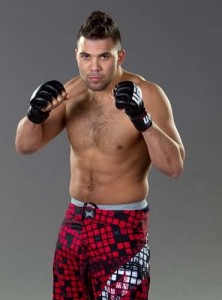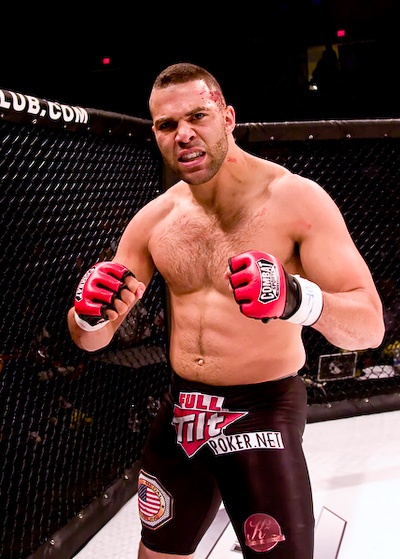
If a mixed martial artist enters the ring or cage enough times, the fighter will eventually have that zero in the loss column turn into a one. Even seemingly indestructible fighters like Anderson Silva and Georges St. Pierre succumbed to an opponent early in their careers. On June 19th, Kris "Savage" McCray lost his first pro fight to Court McGee at The Ultimate Fighter (TUF), Season 11 Finale event in Las Vegas. Despite the loss in the Spike TV reality series, a look into McCray's MMA journey serves as a guide book of sorts for young amateur fighters trying to reach the Ultimate Fighting Championship (UFC).
McCray moved frequently during his formative years because his father served in the U.S. Army. Growing up in the Deep South and in Germany, life was not easy for a mixed-race child. McCray often got into fights and scuffles with other kids. He eventually channeled that energy by taking Tae-Kwon Do at age 12 and later wrestled in high school when his family moved to Woodbridge, Virginia. McCray earned his nickname during his time in the U.S. Army Reserve. He would eat and act like a "savage" and the name stuck with him. After his time in the reserve, he started learning Brazilian Jiu-Jitsu (BJJ) with Team Gold Medal Grappling, a Lloyd Irvin affiliate. McCray always knew deep down that he was "built" to be a fighter.
McCray began his amateur career at Ruckus in the Cage 5 in Roanoke, Virginia, fighting wrestler Robby Houston who was 2-0 at the time. McCray came away with a majority decision victory in his first ever MMA fight. He ran his amateur record to 10-0 before turning pro. McCray then decided to join the Ultimate Warrior Challenge (UWC) because the promotion had credibility in the Virginia area. UWC fights, held at the Patriot Center in Fairfax, Virginia, often attracted top UFC fighters as spectators. The venue also drew crowds in the thousands and offered good lighting for viewing. McCray began a good relationship with UWC founder Marcelo Foran, who eventually became his agent.
His pro debut was at UWC 4 where he won by submission (rear-naked choke). McCray would win his next two fights for the UWC by submission and his fourth pro fight by TKO. At Ballroom Battleground 1 in November of 2009, McCray picked up his fifth pro victory by shoulder lock.
Having success on smaller circuit shows, McCray had even higher aspirations. He wanted to fight for the UFC and tried out for TUF seasons 9 and 10. At these tryouts, McCray went through three major evaluation stages. The sessions included grappling, pad work and interviews. McCray tapped his guy during the grappling stage and felt he showed enough hitting the pads and in the interview sessions to be on the show. During the tryouts, McCray weighed about 190 pounds.

However, the UFC ultimately chose lightweights (155 pound limit) and heavyweights (265 pound limit) respectively for each season. When the casting call came out for TUF season 11, McCray did not attend since the UFC had all the information they needed on him. TUF season 11 would feature middleweights (185 lbs), a better fit for the "Savage." He received the call from the UFC and earned his spot in the house with a victory over Cleburn Walker. McCray set a record for fights on TUF with five fights in six weeks. He beat Josh Bryant, whom McCray called a "square block who hits hard," in the semi-finals to make the finale. Bryant had beaten McCray earlier in the show.
McCray showed he had heart and toughness during his fights on the show, but he also never complained when it came to training. McCray loves to train--six days a week, two to three times a day drilling, grappling and doing pad work at Team Lloyd Irvin. McCray says he does not model his MMA game after any particular fighter, but picks up elements from top fighters. He learned how to effectively cage walk back to his feet from his TUF coach and former light heavyweight champion, Tito Ortiz, and picked up wrestling pointers from lightweight contender and All-American wrestler Gray Maynard.
According to his strength and conditioning coach, D'Angelo Kinard, McCray is hungry and willing to work. Kinard believes that with experience McCray could become a top level fighter, but possibly at a different weight class. Kinard thinks he could easily drop to 170 pounds due to his body frame and fight at welterweight with the proper diet and training regimen. McCray normally walks around at 205 pounds, but guys like Anthony Johnson and Thiago Alves routinely cut from 200 plus pounds to fight at 170 pounds. McCray quips that one of his goals is to eventually fight Georges St. Pierre, the current 170 pound champion.
McCray understands he has much to learn in the fight game, but he knows that he fights for the right reason--he loves the sport. He advises young fighters to be consistent in training and make sure the people around you do not weigh you down. McCray notes that if "you are not pushed, you are getting pulled" and that being a fighter is a long-term sacrifice. McCray may have lost his undefeated record, but his sacrifices won him a spot in the UFC.
On behalf of Access Athletes, we would like to thank Kris "Savage" McCray for taking time out of his busy schedule to do an interview with The Real Athlete Blog. For more information, you can visit Kris' website: http://www.krismccray.com/.



